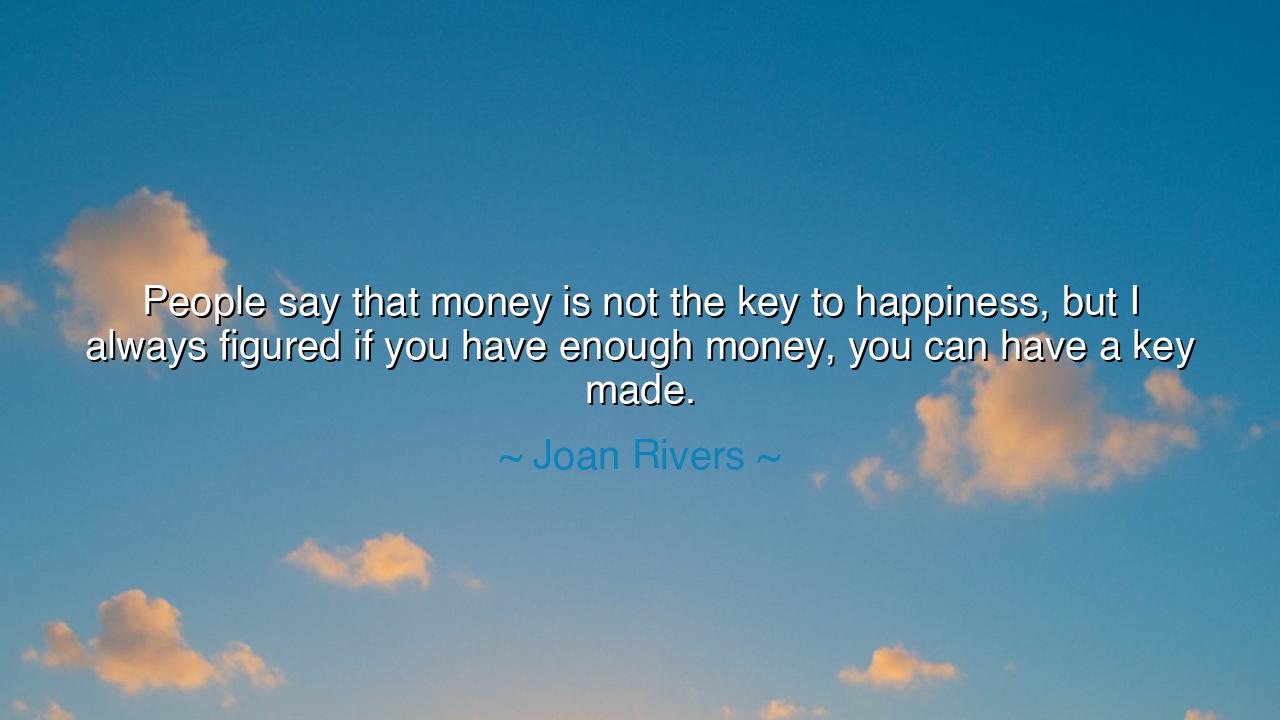
People say that money is not the key to happiness, but I always
People say that money is not the key to happiness, but I always figured if you have enough money, you can have a key made.






The legendary comedian Joan Rivers, known for her sharp wit and fearless humor, once said, “People say that money is not the key to happiness, but I always figured if you have enough money, you can have a key made.” At first glance, her words sparkle with laughter — a jest born from her mastery of irony. Yet beneath the humor lies a truth both clever and profound: money may not buy happiness itself, but it can grant the means, the freedom, and the opportunity to seek it. Rivers’ wit exposes both the hypocrisy and the hope hidden in humanity’s eternal dance with wealth — the paradox that while joy cannot be purchased, poverty can make its pursuit unbearably difficult.
To understand the spirit of this quote, one must know the woman who spoke it. Joan Rivers was not born into comfort. She began her life in modest circumstances and clawed her way upward through rejection, humiliation, and relentless perseverance. Her humor was her armor — and her weapon. She knew what it meant to struggle for survival in an industry that often favored beauty over wit, youth over endurance. When she spoke of money, she did not speak from greed, but from experience — from the hunger of one who had lived without it, and the awareness of what it can and cannot solve. Her jesting tone hides a hard truth: in a world ruled by material needs, financial stability is not happiness, but it is often the foundation upon which happiness is built.
The ancients, too, wrestled with this question. Aristotle, in his teachings on the “good life,” argued that happiness (eudaimonia) depends on virtue — yet he admitted that wealth and resources are necessary to practice virtue fully. A hungry man, he said, cannot easily pursue wisdom or justice; his mind is burdened by survival. Thus, while happiness itself is spiritual, the conditions for it are often physical. Rivers’ humor echoes this eternal tension. When she says she can “have a key made,” she acknowledges that money may not unlock the door of happiness — but it can buy the tools, the time, and the security needed to build that door anew.
We see this truth reflected across history. Consider Andrew Carnegie, the steel magnate who rose from poverty to immense wealth. As a young man, he worked tirelessly to escape the factory floor. Yet, once he achieved riches, he devoted his fortune to education, libraries, and peace — believing that wealth should serve humanity’s betterment. His happiness did not come from gold itself, but from the freedom it gave him to create meaning. Likewise, Rivers’ humor points to the same revelation: money may not hold happiness, but it can grant the freedom to seek fulfillment beyond mere survival.
Still, there is warning in her jest. Money can forge a key, yes, but not if one mistakes the key for the treasure. Many have amassed wealth only to find themselves empty, for happiness cannot be bought — it must be lived. The world is filled with those who possess everything except peace. Joan Rivers, in her wisdom disguised as laughter, invites us to see money as a servant, not a master. It can build comfort, but not contentment; it can open doors, but not hearts. The key to happiness may be shaped by silver and gold, but its lock opens only to gratitude, love, and purpose.
There is also in her words a defiant kind of hope — a refusal to accept limitation. Her humor whispers: if the world denies you the key, make your own. If fortune does not favor you, create your own path. This is the deeper lesson behind her laughter — that human beings are not powerless before circumstance. The spirit of self-reliance, of ingenuity, of sheer will — that is the true forge of the key. Money, in this sense, becomes a metaphor for resourcefulness, for the ability to shape destiny rather than wait for grace. Rivers’ jest becomes a hymn to perseverance, cloaked in comedy.
So, my child, take this teaching to heart: do not worship money, but neither despise it. Seek not wealth for its own sake, but understand its place in the architecture of a meaningful life. Use it to create freedom, to lift others, to cultivate beauty and learning. But remember that the richest vault is empty if love and laughter do not dwell within it. As Joan Rivers taught with both humor and grit — if happiness has no door, do not despair. Gather your courage, your labor, your wit, and make yourself a key. For though joy cannot be purchased, it will gladly open its gates to those bold enough to build their own way in.






AAdministratorAdministrator
Welcome, honored guests. Please leave a comment, we will respond soon